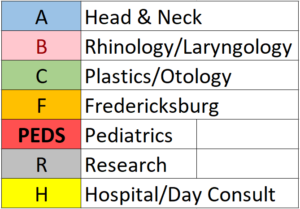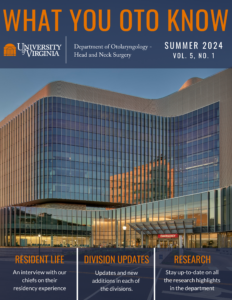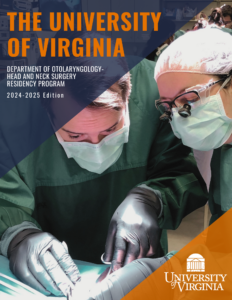Program Description
The Department of Otolaryngology-Head and Neck Surgery offers a five year accredited residency training program accepting three residents at each level and provides training in all aspects of Otolaryngology – Head and Neck Surgery.
Program Schedule
Rotation Key

PGY-1 consists of 13 rotation blocks (exclusive to PGY-1):
- 3 months on Hospital Consult
- 1 month each on Head & Neck, Rhinology/Laryngology, and Facial Plastic/Otology
- 1 month each on Neurosurgery, Neuroradiology/Radiation Oncology, Thoracic surgery, and a critical care unit
- 2 months on General Surgery (UVA & Salem VA Hospital)
The last month of internship is your transition month into the Oto-HNS Department. You will participate in clinic and in the operating room, in addition to taking call with more senior residents.

PGY-2 consists of 12 rotation blocks:
- 4 months on Head and Neck
- 3 months on Facial Plastic/Otology
- 2 months on Rhinology/Laryngology and Pediatrics
During this year, you will develop a foundation for Otolaryngology, beginning with a focused head and neck examination, making diagnoses, and participating in the treatment plan. Operative exposure with procedures such as tonsillectomies, adenoidectomies, myringotomy & tube placement, adult & pediatric tracheostomies, direct laryngoscopy, etc.

PGY-3 consists of 12 rotation blocks:
- 2 month blocks each on Head and Neck, Rhinology/Laryngology, Facial Plastic/Otology, and Pediatrics
- 4 month research block
You will be directly involved with more advanced procedures such as mastoidectomy, septoplasty, neck dissections, & free-flap harvests. The research block is to be used for a scientific project of your choice.

PGY-4 consists of 12 rotation blocks:
- 3 month blocks each on Head and Neck, Rhinology/Laryngology, and Facial Plastic/Otology
- 3 month block on private practice in Fredericksburg, VA
You will be exposed to the full spectrum of operative experiences within the specialty as an opportunity to fine tune your surgical and clinical skills in preparation for your chief resident year.

PGY-5 consists of 12 rotation blocks:
- 4 month blocks each on Head and Neck, Rhinology/Laryngology, and Facial Plastic/Otology
You practice excellent continuity of care and a more in-depth clinical and operative experience. This is a year in which all the previous experiences come together as you function as the leader of a clinical team, preparing you for success after residency – whether that entails private practice, fellowship, or academic medicine. The last month of PGY-5 has two weeks on service and the last 2 weeks off to prepare for your future career.

What You Oto Know and Program Booklet
Newsletter Archive
What You Oto KnowYou can also check out our newsletter, What You Oto Know, to learn more about our faculty and residents, read updates from each division, review our latest research and much more. You can read our most current edition here or click the button to view previous editions.

For a more comprehensive overview of our program, read our residency program booklet.

